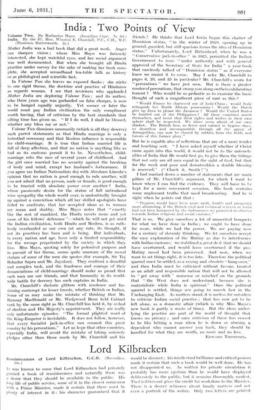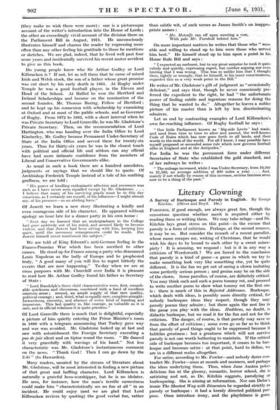Lord Kilbracken
Lord Kilbracken, G.C.B. (Macmillan.
IT was known to some that Lord Kilbracken had privately printed a book of reminiscences and naturally there was a desire that they should be available to the public. His
long life of public service, some of it in the closest connexion with a Prime Minister, made it certain that there must be Plenty of interest in it : his character guaranteed that it would be discreet ; his intellectual brilliance and critical powers made it certain that such a book would be well done. He has not disappointed us. As written for private circulation it probably has more egotism than he would have displayed deliberately to the public, but it remains thoroughly modest. The Civil Servant gives the credit for work done to the Minister. There is a decent reticence about family matters and nut even a portrait of the writer. Only two letters arc printed (they make us wish there were more) ; one is a picturesque account of the writer's introduction into the House of Lords ; the other an exceedingly vivid account of the division there on the Parliament Bill in August, 1911. He unconsciously illustrates himself and charms the reader by expressing more often than any other feeling his gratitude to those he mentions or sketches. We are glad, indeed, that he lived well past four score years and incidentally survived his recent motor accident to give us this book.
Do young people know who Sir Arthur Godley or Lord Kilbraeken is ? If not, let us tell them that he came of mixed Irish and Welsh stock, the son of a father whose great promise was cut short by his early death in 1861. At Rugby under. Temple he was a good football player, in the Eleven and Head of the School. At Balliol he won the Hertford and Ireland Scholarships and became on the nomination of the second founder, Mr. Thomas Baring, Fellow of Hertford ; and he kept up his connexion with scholarship by examining at Oxford and at most of the public schools, and as Governor of Rugby. From 1872 to 1882, with a short interval when he was Private Secretary to Lord Granville, he was Mr. Gladstone's Private Secretary. Then, on the recommendation of Lord Hartington, who was handing over the India Office to Lord Kimberley, Mr. Godley became Permanent Under-Secretary of State at the India Office and served there for twenty-six years. Thus for thirty-six years he was in the closest touch with political and official life and seldom can any official have had more intimate confidence from the members of Liberal and Conservative Governments alike.
As usual in such a book there are a hundred anecdotes, judgments or sayings that we should like to quote. Of Archbishop Frederick Temple instead of a tale of his scathing gruffness, we are told :
" His power of kindling enthusiastic affection and reverence was such as I have never seen equalled except by Mr. Gladstone.. . . I believe that many of his surviving pupils must be to this day conscious, as I certainly am myself, of his influence—I might almost say, of his presence—as an abiding force."
Of Jowett we learn a new story illustrating a kindly and even courageous side of his character. He appeared without apology an hour late for a dinner party in his own house :
" Next day we learned that an undergraduate in the College had gone suddenly out of his mind, and seemed likely to become violent, and that Jowett had been sitting with him, keeping him quiet, until the necessary arrangements could be made. But Jowett himself never mentioned the subject."
We are told of King Edward's anti-German feeling in the Franco-Prussian War which has been ascribed to other causes. He stood up for France among a party who denounced Louis Napoleon as the bully of Europe and he prophesied truly, " A good many of you will live to regret bitterly the events that are now happening." To-day when we are at cross purposes with Mr. Churchill over India it is pleasant to read how Mr. Arthur Godley found his father as Secretary of State :
" Lord Randolph's three chief characteristics were, first, remark- able quickness and cleverness, combined with a fund of excellent common sense ; second, an ample supply of that rare quality, political courage ; and, third, what is equally rare, complete straight. forwardness, sincerity, and absence of every kind of humbug and imposture. This last quality is, like courage, as valuable as it is rare, and in official relations it is quite priceless."
Of Lord Granville there is much that is delightful, especially a picture of him quietly entering the Prime Minister's room in 1880 with a telegram announcing that Turkey gave way and war was avoided. Mr. Gladstone looked up at last and saw with astonishment the Foreign Secretary executing a pas de joie silent and on tiptoe round the room. " He danced it 'very gracefully with wavings of his hand." Not less characteristic was Mr. Gladstone's instantaneous comment on the news. " Thank God ! Then I can go down by the 2.46 " (to Hawarden).
Many readers, unsated by the stream of literature about Mr. Gladstone, will be most interested in finding a new picture of that great and baffling character. Lord Kilbracken is naturally a grateful hero-worshipper, but he is no idolater. He sees, for instance, how the man's terrific earnestness could make him " characteristically see no fun at all " in an incident. He could enjoy (and we are glad that Lord Kilbracken revives by quoting) the good verbal fun, rather
than subtle wit, of such verses as James Smith's on inappro- priate names : " Mr. Metcalfe ran off upon meeting a cow. With pale Mr. Turnbull behind him."
On more important matters he writes that those who " were able and willing to stand up to him were those who 'served him best." He himself stood up to him upon a point in his Home Rule Bill and says : " I expected an outburst, but to my great surprise he took it quite calmly and quietly, expressing regret, but neither arguing nor even hinting that I was wrong. This was so unlike him that I thought then, right1y or wrongly, that he himself, in his inner c'onscioueness, regarded this as a very weak point in the Bill." -
He writes of Mr. Gladstone's gift of judgment as "occasionally deficient," and says that, though he never consciously pre- ferred the expedient to the right, he had " the unfortunate power of finding subtle and ingenious reasons for doing the thing that he wanted to do." Altogether he leaves a nobler picture of his master than is left by less discriminating admirers.
Let us end by contrasting examples of Lord Kilbracken's own far-reaching influence. Of Rugby football he says :
" Our little Parliament known as ' Big-side Levee ' had made, and used from time to time to alter and amend, the well-known Code of Rules which has now gone forth to all lands, and their words to the ends of the world. For all I know, I may possibly have myself proposed or seconded some rule which now governs football alike in England and at the Antipodes."
For India he was the permanent force under different Secretaries of State who established the gold standard, and of her railways he writes :
" The mileage increased, while I was Under-Secretary, from 10,500 to 31,500, an average addition of 800 miles a year. . . . And, mainly if not wholly by reason of this increase, serious famines seem now to be a thing of the past."







































 Previous page
Previous page